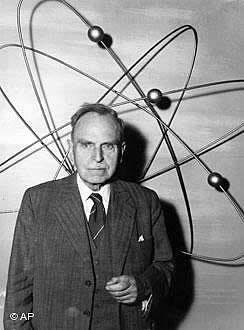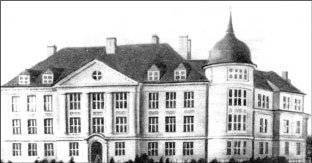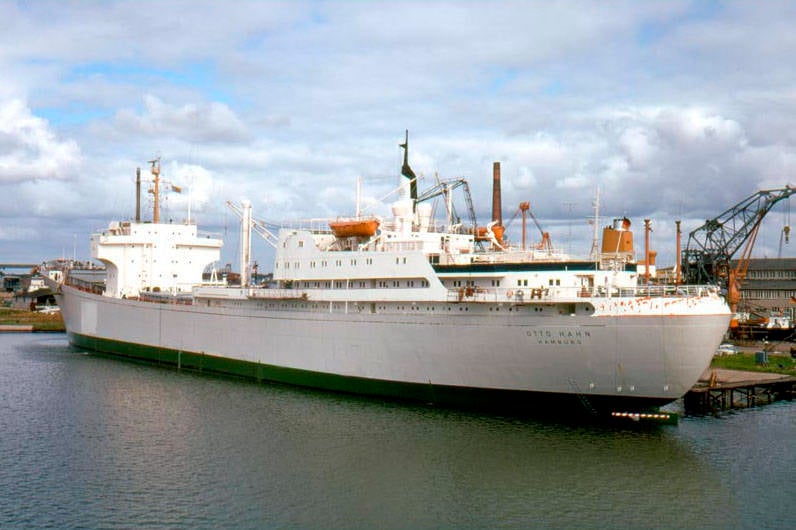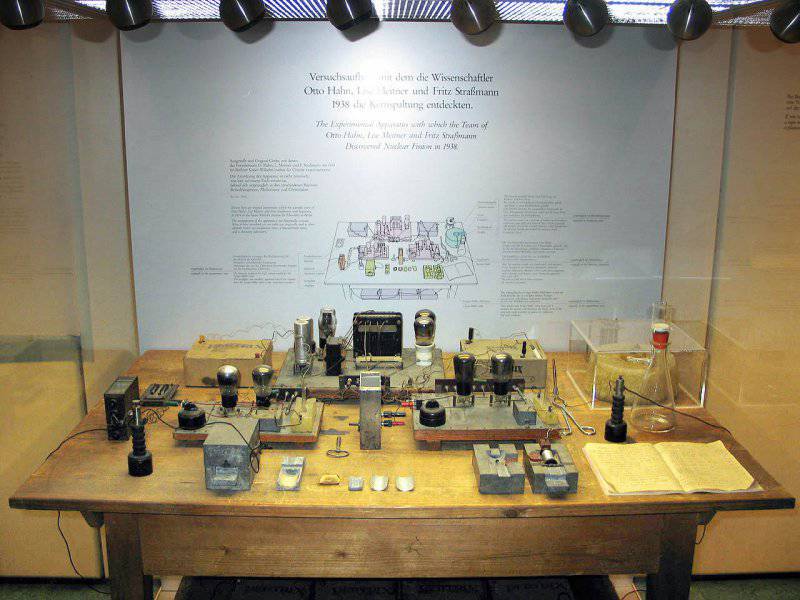Triumph and tragedy of Otto Ghana. Part II
 Let's go back to Berlin, to Ghana. This work was the culmination of his scientific work. Next - silence, a departure from science. Why? One can only guess. Germany was changing, and it was impossible not to notice. Racism rudely hit employees: one by one they quit, their Jewish colleagues left. The biggest blow, of course, was the departure of Lisa Meitner. Although Gan, who never went from a hypothesis to its actual confirmation, was leading in their tandem, preferring to start with observations and experience, separation hurt him more painfully. Liza did not return to Germany anymore, she first worked with Bohr, a lot in London, keeping to the end of her life (she only survived an old friend for a few months) an enviable performance.
Let's go back to Berlin, to Ghana. This work was the culmination of his scientific work. Next - silence, a departure from science. Why? One can only guess. Germany was changing, and it was impossible not to notice. Racism rudely hit employees: one by one they quit, their Jewish colleagues left. The biggest blow, of course, was the departure of Lisa Meitner. Although Gan, who never went from a hypothesis to its actual confirmation, was leading in their tandem, preferring to start with observations and experience, separation hurt him more painfully. Liza did not return to Germany anymore, she first worked with Bohr, a lot in London, keeping to the end of her life (she only survived an old friend for a few months) an enviable performance.The main reason for the departure of Ghana from science was his high moral rules, no matter how archaic these words sounded in our time. Of course, from the inside, for the German philistine, fascism looked different from the outside. Everything was done under the slogan: for the good of the people, for the future of great Germany. It inspired the philistines to illusions - but not to Ghana, who once “pecked” on patriotic slogans and burned. Caught at the crossroads, Gan clearly saw three paths. One of them chose Heisenberg, who began active work on the uranium project. It soon became clear that the Nazis considered receiving the atomic bomb as the ultimate goal of the project. Justify or condemn Heisenberg? For a scientist, every interesting problem is a great temptation, often outweighing moral considerations. The second way - departure, he was chosen by Fermi, Einstein. Gan chose the third - silence, silence, the ability not to fight on any side. Age, wisdom, a great scientific career made it possible to make such a decision, which Gan later never regretted.
Gan was a high-class professional, a man who owes everything to himself alone. From the first to the last day of his active research career, he did everything, even rough operations, with his own hands, never conducted experiments from the desk. The reward for this was heightened observation, a refined experimental technique and a truly unique experience. In addition, as a result of painstaking years of work, he created the most valuable supply of super-pure substances, which played a significant role in the success of experiments on the fission of uranium nuclei. So accumulated years of work spent on solving problems of purely professional interest and not promising any sensations.
Research facility, in which O. Gan and F. Strassmann discovered the fission of uranium nuclei
Brilliant natural endowments, the ease with which the first success came, did not seem to dispose to special diligence. But Ghana's taste for life organically coexisted with respect for labor, an intuition with strong knowledge. The study of the weakest radiation, work with trace amounts of substances, the constant danger of radioactive contamination required not only the skill of the experimenter, but also the greatest concentration. And Gan possessed it. He worked a lot, earnestly, but at the same time regularly, methodically, clearly, obeying strict discipline. The purity of his research went into the saying. On his desktop, in records, in publications, order reigned. Decades of dealing with radioactive substances, Gan and his permanent staff managed to avoid radiation injury, which was not uncommon in other institutions. As the physicist F. Soddy was surprised to say, referring to Ghana: “As a matter of fact, a person through whose hands so much radioactive substance had passed would no longer have to be alive”.
In all that relates to science, Gan was considered a maximalist. He closed the experiment not when a specific goal was achieved, but only by fully understanding the meaning of all, even minor details. Over the years of 40, Ghana’s style remained unchanged: it did not go from a hypothesis to its confirmation by facts, but from observation and analysis to the formulation of a hypothesis. And at the same time, in his own words, “I often found what I was not looking for.” Respect for facts, whatever they may be, has become law for him. For all his long life in science, Gan never once succumbed to the temptation to dismiss an inconvenient fact, to fit it into a concept, or to pass over in silence. He possessed the highest quality of the researcher to the highest degree - the willingness to bring his thoughts to the court of experience.
Good service has served Ghana memory. He possessed immense knowledge, and a rare memory prompted them to him at the right moment. Already at an advanced age, he recited long passages from Homer, which he had once memorized as a company with his brother Karl, a high-school student, in immaculate Greek. Having an absolute ear for music, he remembered the themes of all the Beethoven symphonies and many of Tchaikovsky's symphonies.
And in Germany, Wagner’s music and military marches thundered. Gan did not seek the favor of the new masters of the country and more than once dared to oppose them. According to many reviews, he not only helped his colleagues who were subjected to repressions, but also attracted friends abroad to this. Steadfastly resisted interference
“From above” into the work of the Chemical Institute, which he incurred accusation of political unreliability, and at the end of the war he refused to carry out the order to destroy the institute. He convinced the burgomaster of the town of Thylfingen not to resist the advancing French units and thereby saved the town from destruction.
12 has lived for years in a repressive regime and without entering into open political confrontation with him, he managed to preserve his spiritual independence, professional and personal dignity, and an honest name. This is confirmed by the letter from Einstein to Ghana in response to an invitation to join the Max Planck Society. “It hurts me that I have to send my refusal to you, one of the few who in these terrible years remained true to his convictions and did everything that was in his power. However, I cannot do otherwise ... I feel an irresistible antipathy to participate in any undertaking concerning the public life of Germany ... Someone else, and you will understand it. ”
 In April 1945, the Western occupation authorities deported Ghana and nine other German nuclear physicists to England. Six months later, Gan returned to the western zone of Germany. In this last period of his life, the scientist departed from research, engaging in organizational and social activities. Contemporaries noted the wisdom of this man. There was no vainness in him, he clearly distinguished between himself genuine and imaginary, he did not envy his colleagues, he knew how to appreciate someone else’s talent and knowledge. With genuine interest, he spoke about fellow scientists, and Rutherford considered the ideal researcher. Ghana did not attract even the power to rule over people, and those in power did not arouse admiration. By assuming leadership, Gan did it only in the interests of the cause. His leadership was morally secured by talent and experience, no doubt disinterestedness. Gan was not "convenient", i.e. appeasable, but was considered an objective and correct leader. For all his severity, he demanded from his subordinates only what and of himself. He admires such a rare virtue for a leader as scrupulousness in matters of priority. By signing another joint work, Gan and Meitner put in the first place the name of the one who this time made a greater contribution to it.
In April 1945, the Western occupation authorities deported Ghana and nine other German nuclear physicists to England. Six months later, Gan returned to the western zone of Germany. In this last period of his life, the scientist departed from research, engaging in organizational and social activities. Contemporaries noted the wisdom of this man. There was no vainness in him, he clearly distinguished between himself genuine and imaginary, he did not envy his colleagues, he knew how to appreciate someone else’s talent and knowledge. With genuine interest, he spoke about fellow scientists, and Rutherford considered the ideal researcher. Ghana did not attract even the power to rule over people, and those in power did not arouse admiration. By assuming leadership, Gan did it only in the interests of the cause. His leadership was morally secured by talent and experience, no doubt disinterestedness. Gan was not "convenient", i.e. appeasable, but was considered an objective and correct leader. For all his severity, he demanded from his subordinates only what and of himself. He admires such a rare virtue for a leader as scrupulousness in matters of priority. By signing another joint work, Gan and Meitner put in the first place the name of the one who this time made a greater contribution to it.Gan endured and the test of fame. Unlike many lovers of exaggerating their virtues, he was a master at minimizing them. I never renounced my non-aristocratic lineage, I was in no hurry to change my lifestyle to a more refined one. Infinitely respecting science, valuing the reputation of a serious researcher, he did not consider himself omniscient, not afraid to discover his ignorance of something. It was a great pleasure to him in response to an overly clever question to say in a friendly and ingenuous way: “I don’t understand anything at all” - to admire the interlocutor’s amazement. Apparently, in his old age there lived a tomboy-boy who was not averse to making fun of people depicting scholarship.
And he was never a desk recluse, a gloomy ascetic. He managed to keep a surprisingly joyful attitude, the ability to perceive life as a happy gift. He needed friends, had an extraordinary talent for communication. Interest in the surrounding, thirst for new impressions Gan retained until the end of days. He steadfastly resisted old age and disease, not wanting to give them anything that he loved. In 80 over the years, having dismissed all the warnings, I was alone going to the mountains - he was fascinated by mountaineering from an early age.
Although from the side of Gan seemed a darling of fate, his personal life was not idyllic at all. My wife suffered from a mental illness. The only son in the war years was injured and still young died in a car accident. The scientist in his old age was seriously ill. He was an optimist rather in spite of circumstances than thanks to them.
He was relieved by humor. Witty remarks, apt, but always tactful, are memorable to many of his colleagues. Often, Gan made fun of himself and even in circumstances where others were not amused. He even laughed in a hospital bed when he fell victim to an assassination attempt in 1951: a mentally ill inventor seriously injured him. In a conversation with the wife of physicist Heisenberg, Gan somehow dropped a wonderful phrase: “I have always been a clown, although my heart was breaking.”
Harmonious acceptance of life, despite all its sorrows, has become one of the sources of its spiritual energy and creative productivity.
In the 1945 year, Gan took over the leadership of the them. Max Planck, created instead of the Kaiser Wilhelm Society. This scientific organization owes much of its development to the energy of Ghana. As head of the Society, Gan maintained contacts with foreign comets. The very fact that the Nobel Prize “For the discovery of the fission of heavy nuclei” was awarded to him in 1945 in Germany was perceived as an event of national importance. According to the public, Gan helped restore the heavily tarnished reputation of the Germans. However, he was never just a decorative dress figure in West German politics. In February 1946, Gan rejected the proposal to go abroad: "I can not turn my back on Germany at such a moment."
In February 1955, Gan radio addressed the population of Germany, Denmark, Austria, Norway and the UK with a speech “Cobalt 60 - a threat or a boon to humanity”. And in July of the same year, on the initiative of the Ghana 16 scientists, Nobel laureates, issued a statement warning humanity about the possibility of nuclear war. When in Germany, disputes broke out about equipping the Bundeswehr with nuclear weapons, Gan and his associates published a so-called Göttingen declaration, in which they firmly opposed the atomic armament of West Germany. This provoked a rage from the federal government. An invitation to the federal office followed, where the scientists defended their position. Their statement had a real impact on the formation of public opinion in the country, and the main merit in this belongs to Ghana. As one of the newspapers wrote: “In the eyes of the Germans, the signature of O. Ghana may have more weight than the signatures of all other scientists combined, not only because he is considered the elder of German science, but also because his decision is clearer , than any other, is an act of conscience. "
Contemporaries honored him not only talent, but also a man who clearly showed what a moral duty of a scientist is and showed a model of honest service to duty.
Otto Gan passed away on 28 on June 1969 of the year. On the gravestone are carved the name of the scientist and the formula for splitting uranium.

In 1968, an ore carrier with a nuclear power plant was built in Germany. (17 thousand tonnes of displacement, one reactor with thermal power 38МВт. Speed of 17 knots. Crew - 60 man and 35 man of scientific personnel). The vessel was given the name "Otto Gan". Over the years of its active service, Otto Gan 10 passed thousands of miles (650 million km), visited the 1,2 port in 33 countries, delivered ore and raw materials for chemical production to Germany from Africa and South America. Considerable difficulties in the career of the ore carrier caused the Suez leadership to ban this shortest route from the Mediterranean to the Indian Ocean - weary of endless bureaucratic restrictions, the need for licensing to enter each new port, and the expensive operation of the nuclear-powered icebreaker, the Germans took a desperate step. In 22, the “nuclear heart” was deactivated and removed, in return, “Otto Gan” received a conventional diesel installation, with which it goes today under the flag of Liberia. [/ I]
Использованная литература:
1. Gernek F. Pioneers of the Atomic Age. M .: Progress, 1974. C. 324-331.
2. Konstantinova S. Splitting // Inventor and Innovator. 1993. No.10. C. 18-20.
3. Khramov Yu. Physics. Biographical directory. M .: Science. 1983. C. 74.

Information